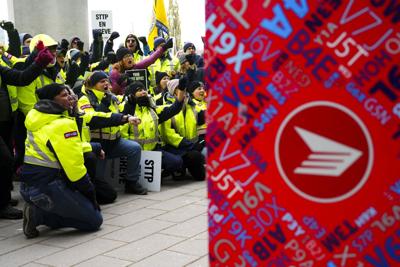The federal government is asking the Canada Industrial Relations Board to order an end to the strike by 55,000 Canada Post workers.
On Friday morning, federal Labour Minister Steven MacKinnon announced he’s asking the board to order Canada Post employees back to work and he is appointing an “industrial inquiry commission,” which will have until May 22 to probe potential ways to reach a new contract agreement.
Until then, the strike, which began on Nov. 15, will be on pause and workers and management will operate under the terms of the existing contract, which expired almost a year ago.
“We’re calling a timeout,” MacKinnon told reporters. After May 22, the commission┬ĀŌĆö to be run by veteran arbitrator William Kaplan┬ĀŌĆö will present a proposal for a potential settlement to both sides.
“Canadians cannot continue to bear the consequences of this impasse. Our priority is to restore postal services while ensuring a fair balance between the rights of workers, those of the employer, but also those of Canadians,” MacKinnon said. “While this provides a temporary solution, the governmentŌĆÖs priority is to get the parties back on track to resolve the dispute and reach agreements.”
The CIRB is expected to rule on the request by early next week, and government sources say it’s unlikely to be rejected. It wasn’t immediately clear how soon CUPW members could be back at work.
“The board will convene the parties as soon as possible to determine next steps,” a CIRB spokesperson said.
In a written statement, the Canadian Union of Postal Workers (CUPW) blasted the government’s intervention.
“The union denounces in the strongest terms this assault on our constitutionally protected right to collectively bargain and to strike,” CUPW said. “This order continues a deeply troubling pattern in which the government uses its arbitrary powers to let employers off the hook, drag their feet, and refuse to bargain in good faith with workers and their unions.”
Canada Post said it was still trying to understand the details of the process, and was eager to see its employees back on the job.
“Canada Post is currently reviewing the details of the minister of labourŌĆÖs announcement this morning to ensure we are prepared to fully participate in the process and comply with the ministerŌĆÖs directive,” the Crown corporation said. “While that unfolds, we look forward to welcoming our employees back to work and serving Canadians and customers. We will take all appropriate steps to support that process as quickly as possible given the direction provided to us by the minister.”
The federal government is ordering an end to the strike by 55,000 Canada Post workers. The strike began Nov. 15.
Labour law professor David Doorey said it’s possible either or both sides could end up rejecting Kaplan’s proposals, and the strike could resume.
“It appears that barring some other new directive from the government, the parties would be back in a legal strike and lockout position as of May 22 if no deal is reached by then,” said Doorey, a professor at York University’s Osgoode Hall law school.
Still, said Doorey, if that happened, MacKinnon could use back-to-work legislation, ask the CIRB to order binding arbitration, or order CUPW to hold a vote on management’s latest offer.
“There are a variety of tools available to him,” Doorey said.
The government is likely hoping Kaplan will find a path to a potential agreement, but the threat of firmer action is still there, said Larry Savage, a labour studies professor at Brock University.
ŌĆ£The hope is that theyŌĆÖll both agree with the recommendations. But if they donŌĆÖt, the minister could impose them,ŌĆØ said Savage, who called the use of an industrial inquiry commission┬Ā“unusual.”
ŌĆ£ItŌĆÖs a very convenient way to have this taken off the governmentŌĆÖs plate, and there could well be an election before Kaplan’s recommendations,” said Savage.
The government’s decision not to intervene sooner likely strengthened its legal case with the CIRB, argued Stephanie Ross, a labour studies professor at McMaster University.┬Ā
“I think they allowed the situation to play out so they have a stronger case that thereŌĆÖs an impasse,” said Ross.
Business groups applauded the move, but said it was too late to save what’s usually a busy holiday season.
“This will be too late to salvage any of the Christmas holiday season for small businesses. With a massive backlog, it will be nearly impossible for any new shipments to make it to Canadians before Christmas through Canada Post,” said Dan Kelly, president of the Canadian Federation of Independent Business.
During the four-week long strike, MacKinnon had repeatedly refused to intervene.
No formal mediation has taken place since Nov. 28,┬Āwhen the mediator called off talks, saying the two sides were too far apart to reach a deal.
The union’s most recent proposal, delivered through a federally appointed arbitrator Monday, lowered wage demands to a 19 per cent increase over four years from the previous 24. It also included a 20-hour per week guarantee for part-time workers.
The company attacked the proposal late Tuesday, saying it would add $2.9 billion to Canada PostŌĆÖs costs over the next four years.
Management previously said it offered wage increases totalling 11.5 per cent over four years and additional paid leave, while protecting the defined benefit pension and job security provisions.
The union initially called for a cumulative wage hike of 24 per cent over four years, as well as suggesting that Canada Post expand into banking.
The company is seeking to provide weekend deliveries and have a greater share of its staff working part-time. The union wants full-time workers to do weekend delivery, while the company wants to hire part-time staff to do the job.
































To join the conversation set a first and last name in your user profile.
Sign in or register for free to join the Conversation